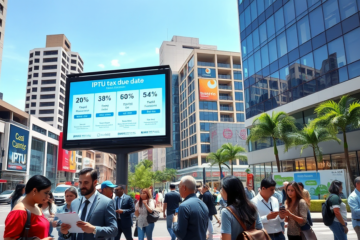Increase in Judicial Recovery in Agribusiness
Judicial Recovery has become a central theme in the Brazilian economic scenario in 2024, with an alarming increase of 70% in requests for this type of process.
This phenomenon is led by the agribusiness sector, which has seen growth of over 50%.
Rising interest rates play a crucial role, particularly affecting small and medium-sized businesses facing financial difficulties.
In this article, we will explore the reasons behind this significant increase, the implications for the market, and how some companies may be using this resource inappropriately to manage high debt, without addressing deeper management problems.
Overview of the 70% increase in judicial recovery requests
In 2024, the economic scenario in Brazil faced significant challenges, reflected by an increase in 70% in requests for judicial recovery.
This phenomenon was mainly driven by high interest rates, which made access to credit difficult and severely impacted companies' liquidity.
According to recent data, the agribusiness sector played a prominent role, accounting for more than half of this increase.
- 70% of total increase in requests for judicial recovery.
- The agribusiness sector represented more than 50% of growth.
- Small and medium-sized companies make up the majority of cases.
Analysts note that, under these conditions, many companies are using judicial recovery as a debt management strategy, noting that some do not have significant management problems, but rather face financial difficulties due to economic conditions.
“Restrictive monetary policy has intensified the structural weaknesses of the Brazilian economy, forcing several companies to resort to judicial recovery as a means of survival,” says an industry expert.
Rising interest rates and their effects on small and medium-sized businesses
In 2024, Brazilian SMEs faced significant challenges due to the increase in the basic interest rate, which increased the cost of capital.
This scenario seriously impacted the cash flow of these companies, resulting in reduced operating margins and restrictions on new investments.
With a 70% increase in judicial recovery requests, it is clear how the rise in credit prices has put pressure on the agribusiness sector and other areas.
| Year | Average Cost of Credit |
|---|---|
| 2023 | 15% aa |
| 2024 | 21% aa |
It is important to highlight that, as economists have identified, SMEs, because they have lesser capacity to negotiate with banks, are the first to feel the weight of high interest rates.
The search for credit has become a challenge, worsening the default and leading many companies to opt for legal solutions to manage their debts.
Data shows that the increase of approximately 17% in interest paid by companies has accentuated the difficulty in accessing credit.
While the buoyant labor market may have helped to some extent, continued pressure from trade tariffs and currency volatility remain challenges to the sustainable growth of these companies.
Therefore, it is essential to adopt measures that can mitigate the adverse effects of this monetary policy, ensuring greater stability for SMEs in the future.
Interest rates, as highlighted, continue to be a significant barrier to the growth of small and medium-sized businesses in Brazil.
Agribusiness as a leader in judicial recovery requests
The agribusiness sector in Brazil registered a significant increase in requests for judicial recovery throughout 2024, consolidating its position as a leader in this scenario.
Were counted 1,272 requests, highlighting the severe impact that adverse economic factors had on the sector.
According to Serasa Experian, 1,272 requests, this increase represents a significant leap and summarizes the difficulties faced by producers, aggravated by the rise in the dollar and interest rates.
The appreciation of the foreign currency made production inputs more expensive, while commodity volatility undermined revenue predictability.
This situation compromised working capital, placing small and medium-sized companies, in particular, in a precarious situation.
Academics and analysts note that Even with a robust production structure, agribusiness is not immune to financial and exchange rate shocks, as one expert highlighted.
Thus, the search for judicial recovery grows as a survival measure in a challenging economic scenario.
The inappropriate use of this tool by some companies also reveals management weakened by debt and dependent on legal solutions.
Possible inappropriate use of judicial recovery
Judicial recovery, although designed to assist companies in real financial difficulty, has seen increasing use that raises concerns about possible strategic or, in some ways, inappropriate applications.
In 2024, the unexpected increase in orders, as data points out, highlights a pattern where some companies, instead of experiencing a real collapse, appear to be taking advantage of the system to gain financial breathing space.
This pattern was particularly evident in the agribusiness sector, where rising interest rates had a strong impact on small and medium-sized businesses.
A hypothetical example involves a company that, despite having significant debts to suppliers, maintains a healthy cash flow.
By filing for judicial recovery, it strategically avoids immediate collections, renegotiating its debts without addressing management deficiencies.
This behavior not only threatens the integrity of the mechanism, but also increases costs for creditors.
As one legal expert points out, “the trivialization of judicial recovery threatens the fair balance between debtor protection and creditor security”.
Therefore, it becomes essential that the judiciary imposes rigorous criteria, ensuring that transparency and accountability prevail in the plans presented for evaluation.
“
Judicial Recovery reflects not only a challenge, but also an opportunity for restructuring in Brazil.
Understanding its causes and consequences is fundamental for the economic future, especially for agribusiness and small and medium-sized enterprises.



0 Comments